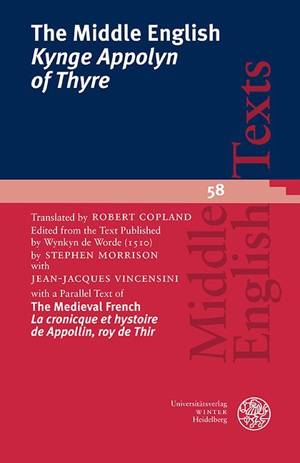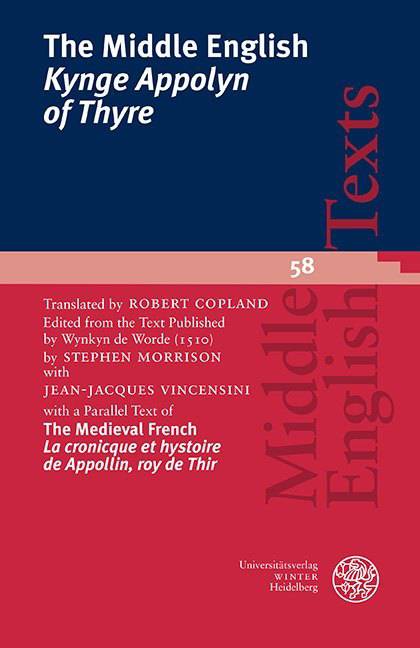
Bedankt voor het vertrouwen het afgelopen jaar! Om jou te bedanken bieden we GRATIS verzending (in België) aan op alles gedurende de hele maand januari.
- Afhalen na 1 uur in een winkel met voorraad
- In januari gratis thuislevering in België
- Ruim aanbod met 7 miljoen producten
Bedankt voor het vertrouwen het afgelopen jaar! Om jou te bedanken bieden we GRATIS verzending (in België) aan op alles gedurende de hele maand januari.
- Afhalen na 1 uur in een winkel met voorraad
- In januari gratis thuislevering in België
- Ruim aanbod met 7 miljoen producten
Zoeken
The Middle English 'Kynge Appolyn of Thyre'
€ 63,45
+ 126 punten
Omschrijving
The Latin 'Historia Apollonii Regis Tyr'i, the original of which may have been written in Greek, is the ultimate source for an extensive network of medieval vernacular versions of the romance narrative 'Apollonius of Tyre'. The Middle English version edited here was published by Wynkyn de Worde in 1510, and is a translation and adaptation by Robert Copland (fl. c. 1505-47) of the Middle French 'La cronicque et hystoire de Appollin, roy de Thir'.In order to illustrate Copland's work as both translator and adaptor, his Middle English text is set in parallel with 'La cronicque'. The Introduction highlights features of Copland's translation practice, in particular his use of doublets, and the extent to which he elaborated points in the narrative and embellished the text. It also discusses Copland as wordsmith by drawing attention to his use of coinings and senses that were new or have rarely been detected. The Introduction concludes with an annotated list of rare lexical items and ante-datings. The parallel texts are preceded by a map of the travels of Apollonius, and followed by a commentary, glossary, index of personal and place names, and a bibliography.
Specificaties
Betrokkenen
- Uitgeverij:
Inhoud
- Aantal bladzijden:
- 115
- Taal:
- Duits
- Reeks:
- Reeksnummer:
- nr. 58
Eigenschappen
- Productcode (EAN):
- 9783825347031
- Verschijningsdatum:
- 14/02/2020
- Uitvoering:
- Paperback
- Formaat:
- Trade paperback (VS)
- Afmetingen:
- 155 mm x 234 mm
- Gewicht:
- 398 g

Alleen bij Standaard Boekhandel
+ 126 punten op je klantenkaart van Standaard Boekhandel
Beoordelingen
We publiceren alleen reviews die voldoen aan de voorwaarden voor reviews. Bekijk onze voorwaarden voor reviews.








